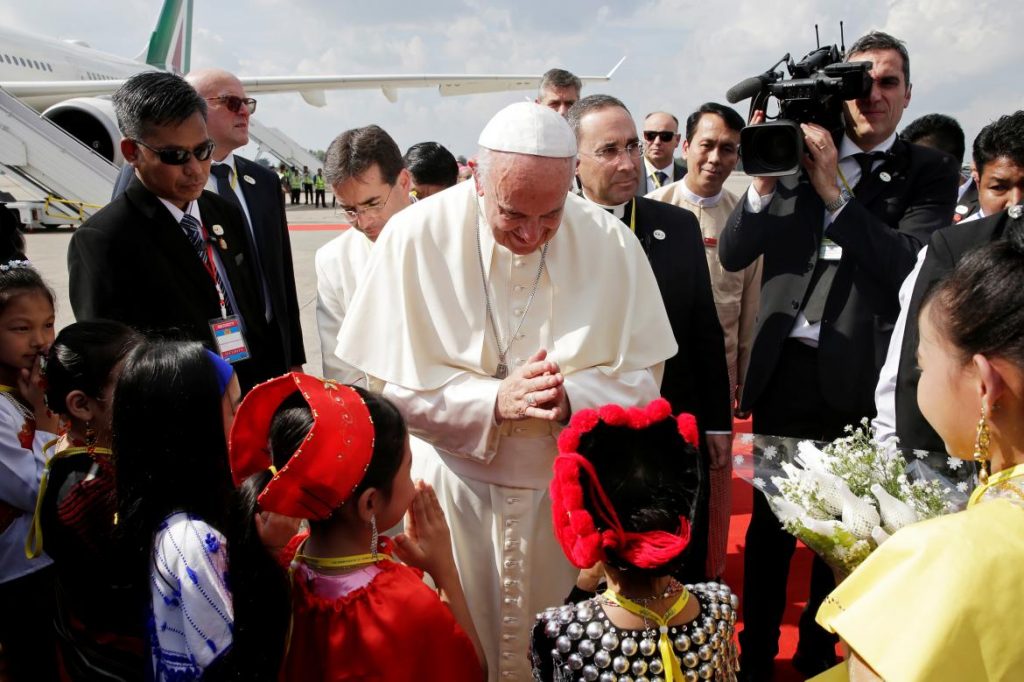By PHILIP PULLELLA & YIMOU LEE | REUTERS
YANGON — Pope Francis held talks on Monday with Myanmar’s military chief at the start of a delicate visit to a majority-Buddhist country that the United States has accused of “ethnic cleansing” against its Muslim Rohingya people.
The leader of the Roman Catholic church will also visit Bangladesh, where more than 620,000 Rohingya have fled to escape what Amnesty International has called “crimes against humanity”.
Myanmar’s army has denied accusations of murder, rape, torture and forced displacement that have been made against it.
The pope’s first meeting in Yangon was with military commander Senior General Min Aung Hlaing in St. Mary’s Cathedral in the heart of the Southeast Asian nation’s largest city.
Support more independent journalism like this. Sign up to be a Frontier member.
“They discussed the great responsibility of authorities of the country in this time of transition,” Vatican spokesman Greg Burke said after the 15 minutes of talks, which were followed by an exchange of gifts.
Francis presented the general with a commemorative medal of his visit, and Min Aung Hlaing gave the pope a harp in the shape of a boat and an ornate rice bowl, Burke said.
The army chief told the pope that “there’s no religious discrimination in Myanmar and there’s the freedom of religion,” according to a statement on the Facebook page of Min Aung Hlaing. “Every soldier’s goal is to build a stable and peaceful country,” the army chief was paraphrased as saying in the statement.
Members of ethnic minority groups in traditional dress welcomed Francis at Yangon airport, and children presented him with flowers as he stepped off his plane.
He waved through an open window at dozens of children waving Vatican and Myanmar flags and wearing T-shirts with the motto of the trip — “love and peace” — as he set off in a car.
Only about 700,000 of Myanmar’s 51 million people are Roman Catholic. Thousands of them travelled by train and bus to Yangon, and they joined crowds at several roadside points along the way from the airport to catch a glimpse of the pope.
More than 150,000 people have registered for a mass that Francis will say in Yangon on Wednesday, according to Catholic Myanmar Church spokesman Mariano Soe Naing.
“We come here to see the Holy Father. It happens once in hundreds of years,” said Win Min Set, a community leader who brought a group of 1,800 Catholics from the south and west of the country.
“He is very knowledgeable when it comes to political affairs. He will handle the issue smartly,” he said, referring to the sensitivity of the pope’s discussions about the Rohingya.
Large numbers of riot police were mobilised in Yangon but there were no signs of any protests.
Sensitivities
The trip is so delicate that some papal advisers have warned Francis against even saying the word “Rohingya”, lest he set off a diplomatic incident that could turn the country’s military and government against minority Christians.
The Rohingya exodus from Rakhine State to Bangladesh’s southern tip began at the end of August, when Rohingya militants attacked security posts and the Myanmar army launched a counter-offensive.
U.S. Secretary of State Rex Tillerson last week called the military operation “ethnic cleansing” and threatened targeted sanctions for “horrendous atrocities”.
Myanmar’s government has denied most of the accusations made against it, and the army says its own investigation found no evidence of wrongdoing by troops.
Myanmar does not recognise the Rohingya as citizens nor as members of a distinct ethnic group with their own identity, and it even rejects the term “Rohingya” and its use.
Many people in Myanmar instead refer to members of the Muslim minority in Rakhine state as illegal migrants from Bangladesh.
Francis is expected to meet a group of Rohingya refugees in Dhaka, capital of Bangladesh, on the second leg of his trip.
The most tense moments of his Myanmar visit were expected to be the private meeting with the army chief and, separately, with State Counsellor Daw Aung San Suu Kyi on Tuesday.
Vatican sources say some in the Holy See believe the trip was decided too hastily after full diplomatic ties were established in May during a visit by Aung San Suu Kyi.
The pope has already used the word Rohingya in two appeals from the Vatican this year.
Asked if he would say it in Myanmar, Burke said Francis was taking the advice he had been given seriously, but added: “We will find out together during the trip … it is not a forbidden word”.
A hardline group of Buddhist monks, previously known as Ma Ba Tha, said it welcomed the pope’s visit but warned, without elaborating, of “a response” if he spoke openly about the Rohingya.
“I hope he doesn’t touch on sensitive issues that Myanmar people couldn’t accept,” said U Tawparka, a spokesman for the group. “There’s no problem if he talks about Islam, but it’s unacceptable if he speaks about Rohingya and extreme terrorists.”







